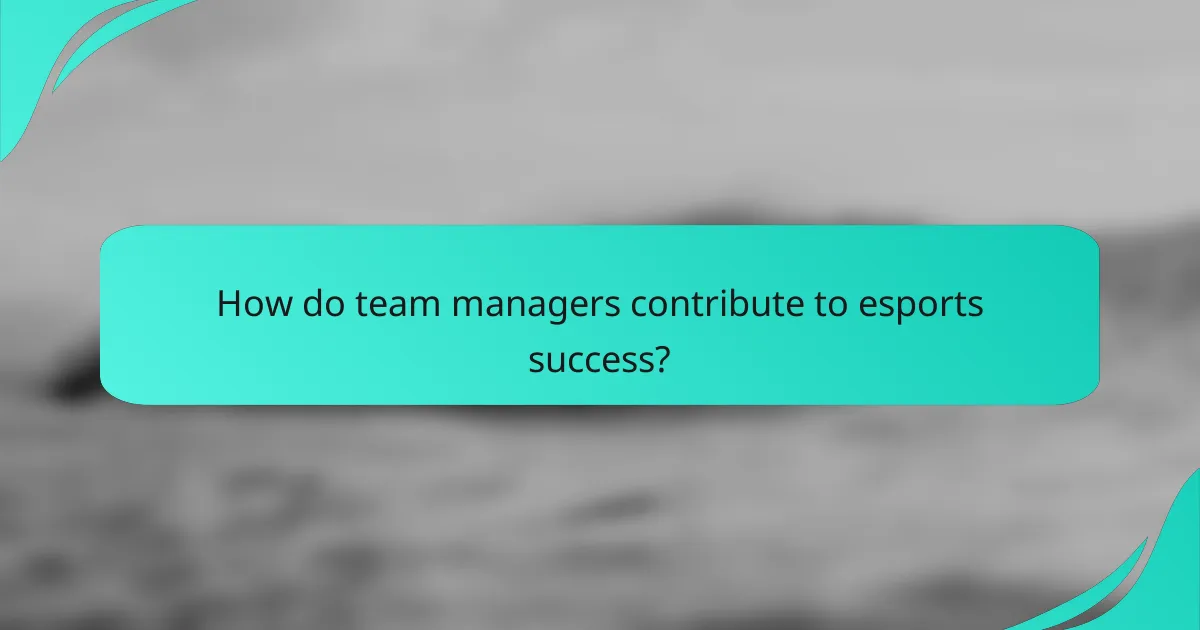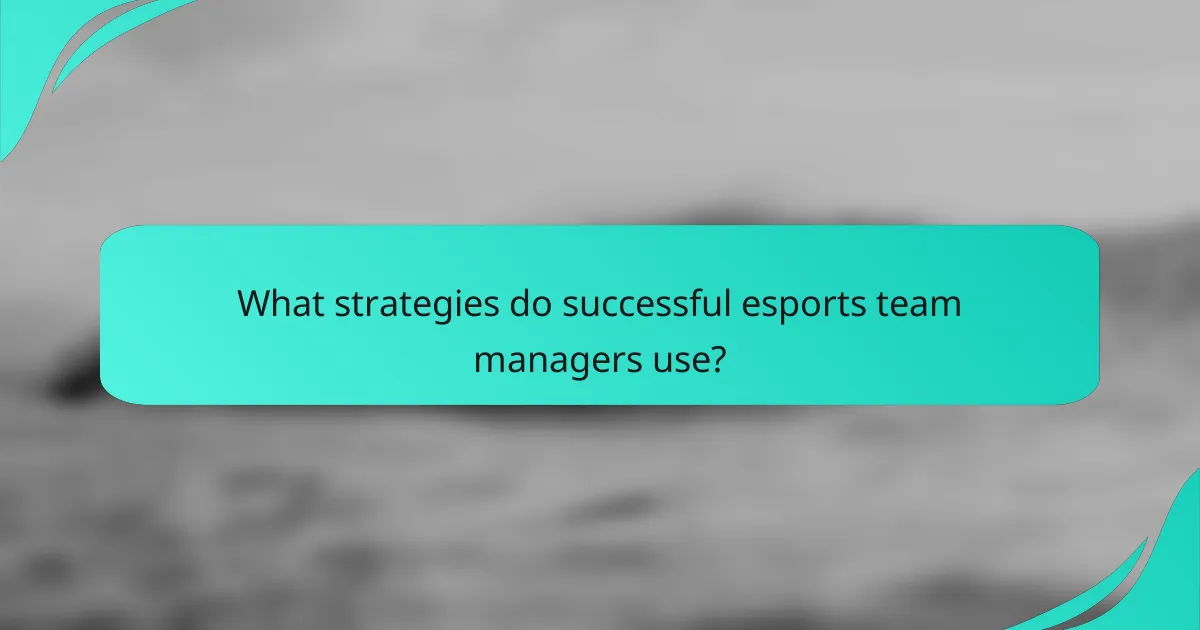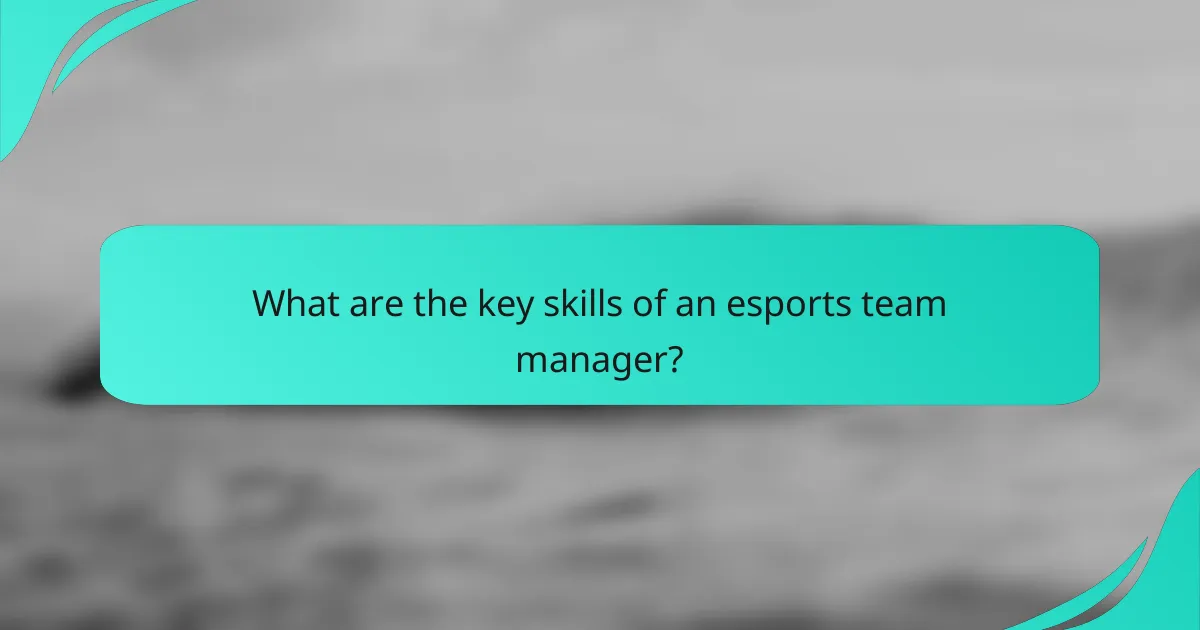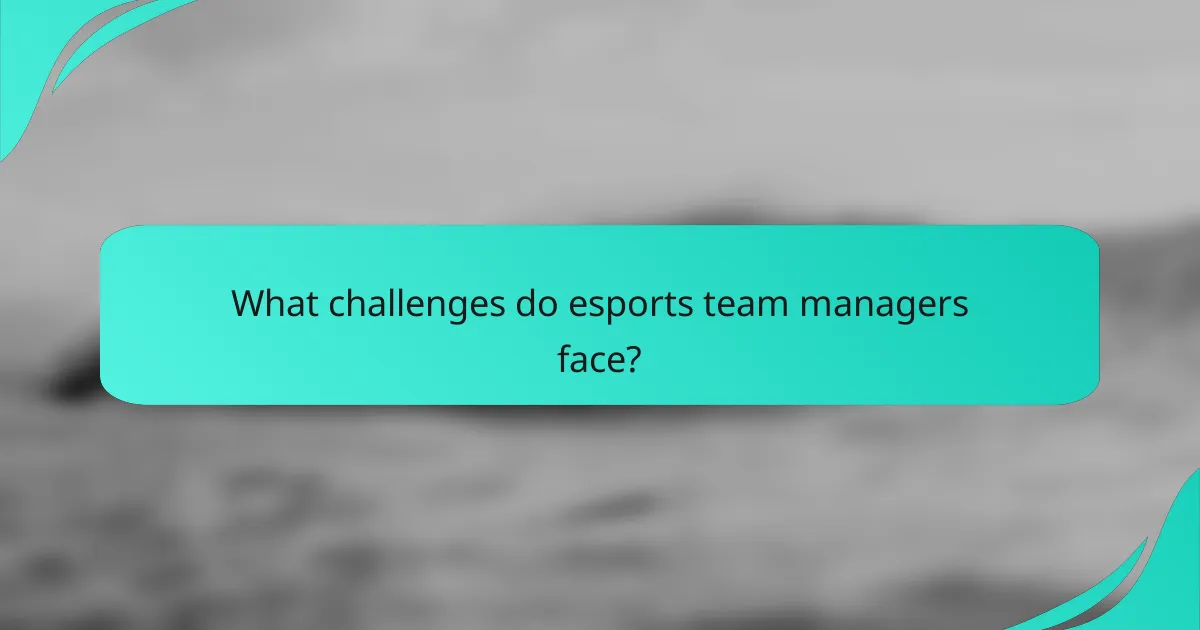In the fast-paced world of esports, team managers are vital to a team’s success, overseeing operations and ensuring players have the necessary resources to excel. Their strategic involvement not only enhances team performance but also fosters a cohesive environment, making them indispensable to any esports organization. By leveraging data analysis and effective communication, successful managers drive their teams toward victory while adapting to the ever-evolving gaming landscape.

How do team managers contribute to esports success?
Team managers play a crucial role in esports success by overseeing operations, facilitating communication, and ensuring that players have the resources they need to perform at their best. Their strategic involvement can significantly impact team performance and cohesion, making them essential to any esports organization.
Leadership and team cohesion
Effective leadership is vital for fostering team cohesion in esports. Team managers must create an environment where players feel valued and motivated, which can enhance collaboration and trust among team members. Regular team-building activities and open communication channels can help strengthen these bonds.
Additionally, a manager’s ability to lead by example sets the tone for the team’s culture. Managers should demonstrate commitment, professionalism, and adaptability to inspire similar behaviors in players.
Strategic planning and execution
Strategic planning involves setting clear goals and developing actionable plans to achieve them. Team managers are responsible for analyzing the competitive landscape and identifying opportunities for improvement. This might include scheduling practice sessions, scouting opponents, and adjusting strategies based on player strengths and weaknesses.
Execution of these plans requires effective time management and resource allocation. Managers should ensure that players are not overworked while still maintaining a rigorous training schedule that prepares them for competitions.
Player development and mentoring
Player development is a core responsibility of team managers, focusing on both skill enhancement and personal growth. Managers should work closely with players to identify areas for improvement and provide tailored training resources, such as coaching or workshops.
Mentoring relationships can also be beneficial. Managers should encourage experienced players to guide newcomers, fostering a supportive environment that promotes learning and growth.
Performance analysis and feedback
Performance analysis is essential for continuous improvement in esports. Team managers should implement systems for tracking player performance metrics, such as in-game statistics and behavioral patterns. This data can inform decisions about training focus and strategy adjustments.
Providing constructive feedback is equally important. Managers should conduct regular performance reviews, highlighting strengths and areas for improvement while encouraging an open dialogue about player experiences and challenges.
Conflict resolution and team dynamics
Conflict resolution is a critical skill for team managers, as interpersonal issues can disrupt team dynamics and performance. Managers should be proactive in addressing conflicts by facilitating discussions and mediating disputes to find mutually agreeable solutions.
Understanding team dynamics is essential for maintaining a positive atmosphere. Managers should regularly assess team morale and address any underlying issues that may affect collaboration and performance, ensuring that the team remains focused on common goals.

What strategies do successful esports team managers use?
Successful esports team managers utilize a combination of data analysis, effective communication, team culture building, and adaptability to game meta changes to drive their teams toward victory. These strategies help in optimizing performance, fostering collaboration, and responding to the dynamic nature of esports.
Data-driven decision making
Data-driven decision making involves analyzing player statistics, match outcomes, and game trends to inform strategies. Managers should regularly review performance metrics such as kill/death ratios, win rates, and in-game decision-making effectiveness to identify areas for improvement.
Utilizing tools like analytics software can help managers visualize data trends and make informed choices about training focus or roster changes. Regularly scheduled data reviews can ensure that decisions are based on the latest performance insights rather than assumptions.
Effective communication techniques
Effective communication is crucial for aligning team goals and strategies. Managers should establish clear channels for feedback and discussion, ensuring that all team members feel heard and valued. Regular one-on-one meetings can help address individual concerns and foster a supportive environment.
Utilizing collaborative tools and platforms can enhance communication, especially for remote teams. Encouraging open dialogue during practice sessions can also help players develop trust and improve teamwork, leading to better in-game coordination.
Building a strong team culture
Building a strong team culture involves creating an environment where players feel connected and motivated. Managers should promote shared values, such as respect, teamwork, and commitment, to strengthen team bonds. Organizing team-building activities outside of gaming can also enhance relationships.
Recognizing individual and team achievements fosters a sense of belonging and encourages players to strive for excellence. Managers should regularly celebrate successes, both big and small, to maintain morale and motivation throughout the season.
Adapting to game meta changes
Adapting to game meta changes is essential for maintaining competitive edge. Managers must stay informed about updates, patches, and shifts in gameplay strategies that can affect team performance. This requires ongoing education and analysis of how changes impact both the game and the team’s playstyle.
Encouraging players to experiment with new strategies during practice can help the team quickly adjust to meta shifts. Managers should facilitate discussions about these changes and their implications, ensuring that the team remains flexible and responsive to the evolving landscape of esports.

What are the key skills of an esports team manager?
An esports team manager must possess a diverse skill set that includes leadership, analytical thinking, communication, and organization. These skills are crucial for guiding teams to success and ensuring smooth operations within the competitive gaming environment.
Leadership and motivational skills
Effective leadership is essential for an esports team manager to inspire and guide players. A strong leader fosters a positive team culture, encourages collaboration, and helps players stay focused on their goals. Motivational skills are equally important, as they enable the manager to boost team morale, especially during challenging times.
To enhance leadership, managers should set clear expectations and provide constructive feedback. Regular team meetings can help maintain alignment and motivate players to perform at their best. Celebrating small victories can also reinforce a sense of achievement and camaraderie.
Analytical and strategic thinking
Analytical skills allow a team manager to assess player performance, study opponents, and develop effective strategies. This involves analyzing game data, understanding meta shifts, and adapting tactics accordingly. A strategic mindset helps in making informed decisions that can lead to competitive advantages.
Managers should regularly review match footage and statistics to identify strengths and weaknesses. Utilizing tools for data analysis can streamline this process. Developing a flexible strategy that can evolve based on opponent analysis is crucial for success in tournaments.
Communication and interpersonal skills
Strong communication skills are vital for an esports team manager to convey strategies, provide feedback, and resolve conflicts. Clear and open communication fosters trust and ensures that all team members are on the same page. Interpersonal skills help in building relationships with players, coaches, and other stakeholders.
To improve communication, managers should encourage an open-door policy where players feel comfortable sharing their thoughts. Regular one-on-one check-ins can also help address individual concerns and strengthen team dynamics.
Time management and organization
Time management is critical for an esports team manager to balance training schedules, match preparation, and administrative tasks. Effective organization ensures that all aspects of team operations run smoothly, from practice sessions to tournament logistics.
Using project management tools can help track schedules and deadlines. Prioritizing tasks based on urgency and importance is key. Managers should also allocate time for player development and team-building activities to enhance overall performance.

What challenges do esports team managers face?
Esports team managers encounter various challenges that can significantly impact team performance and success. Key issues include managing player burnout, navigating sponsorship and branding opportunities, and adapting to rapid changes in the industry.
Managing player burnout
Player burnout is a critical challenge for esports team managers, as the intense competition and long practice hours can lead to fatigue and decreased performance. Managers must monitor players’ mental and physical health, ensuring they have adequate rest and recovery time.
Implementing a balanced schedule that includes breaks, casual gaming, and team-building activities can help mitigate burnout. Regular check-ins with players to discuss their well-being and workload can also foster a supportive environment.
Navigating sponsorship and branding
Securing sponsorships and building a strong brand are essential for the financial stability of an esports team. Managers need to identify potential sponsors that align with the team’s values and audience, creating compelling proposals that highlight the team’s reach and engagement.
Establishing a recognizable brand involves consistent messaging and visuals across platforms. Managers should leverage social media, streaming platforms, and merchandise to enhance brand visibility and attract sponsors.
Adapting to industry changes
The esports industry is dynamic, with frequent changes in game titles, player trends, and viewer preferences. Team managers must stay informed about these shifts to adjust strategies accordingly and maintain competitiveness.
Regularly attending industry events, engaging with community feedback, and analyzing competitors can provide valuable insights. Managers should be flexible and ready to pivot strategies, whether that means changing game titles or altering training methods to keep pace with the evolving landscape.
